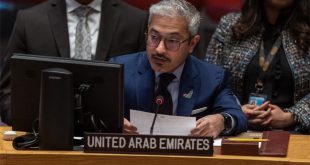New York (ST): The United Arab Emirates reaffirmed the need to respect Syria’s sovereignty, independence and territorial integrity, stressing the importance of transitioning to a new phase of stability and development in Syria.
The Deputy Representative of the UAE, Mohammed Abu Shehab, pointed out in a session of the Security Council on Syria published by the permanent UAE mission to the United Nations on its website that the Syrians are still suffering from the repercussions of the war in their country, and the earthquake came to increase the humanitarian crisis and add new pains to the population, pointing out that it is time to move to a new phase of stability and development in Syria.
Abu Shehab indicated that the establishment of security and stability in Syria will not be achieved without addressing the various security challenges, and devoting diplomatic efforts to resolve the crisis, calling on countries to fold the pages of disagreement, to deal with the crisis in Syria away from the polarization and divisions in the international system.
Abu Shehab said: “We renew our rejection of foreign interventions in Syria and stress the need to respect its sovereignty, independence and territorial integrity.” He strongly condemned the Israeli aggression on Aleppo International Airport, and called on all countries to comply with international law and protect civilian infrastructure, especially after the occurrence of a humanitarian disaster.
Abu Shehab added: “We affirm that activating the Arab role in resolving Arab crises, including the crisis in Syria, is indispensable for establishing stability in the region.
Abu Shehab expressed his country’s full support for the Syrian people during this critical period, as the UAE continues to respond to the difficult conditions as a result of the earthquake, whether by sending relief and medical aid and providing field hospitals, or by working closely with the United Nations to alleviate the suffering of those affected, and said: “My country has received many critical cases from Syria for treatment.”
K.Q.

